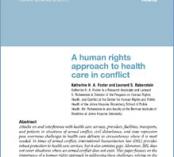
Acts or threats of violence perpetrated against medical personnel, patients, facilities and transports that hinder the provision of medical care, contravene the rules and fundamental principles of international humanitarian law when carried out in situations of armed conflict. However, as recent targeting of health workers in Turkey, Pakistan and Bahrain illustrate, there are many situations of political volatility where humanitarian law does not apply.
“A human rights approach to health care in conflict,” which I wrote with Leonard S. Rubenstein, seeks to illustrate the role human rights law can play in providing for the robust protection of health care in any conflict setting. Even in situations of armed conflict, human rights law, in particular the right to the highest attainable standard of health, can and should provide a powerful complement to strengthening the respect for and protection of health services.
This article addresses the essential elements of a human rights approach to health care in conflict, including principles of nondiscrimination and equality, coupled with entitlements to availability, accessibility, acceptability and quality in health care. It seeks to provide readers with an appreciation of the role of human rights in ensuring that the interests and needs of the powerless and vulnerable are addressed across all conflict settings.

